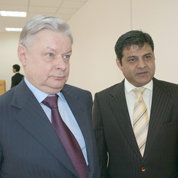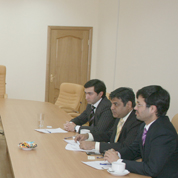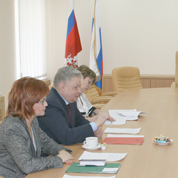FMS and IBA pledge mutual cooperation in handling migration issues

Top Russian Federal Migration Service (FMS) officials and representatives of the Indian Business Alliance (IBA) have drawn up a ‘road map’ for the establishment of effective mechanisms that will ensure timely, operative and more constructive interactions in handling all migration issues confronting both IBA members and other representatives of the rapidly growing Indian diaspora in Russia, and by extrapolation, all members of the expatriate community in the country.
The IBA, the umbrella organization for Indian companies operating in Russia, sees its mission in promotion and development of trade, investments and businesses between India and Russia as well as rendering support to Indian companies and their local Russian partners in the country. Therefore, it was not surprising that the Indian business diaspora delegation to the groundbreaking meeting, which took place in April on the FMS central office in Moscow, was headed by Sammy Kotwani, the IBA president, who is also the owner and CEO of The Imperial Tailoring Co, a company that manufactures bespoke suits in Russia and other CIS countries. Other top IBA members included the Alliance’s Russian representative Ò. Beslangurov and IBA’s First Secretary Abbas S. Meesam.
The FMS was represented by the agency director, Konstantin Romodanovsky, and a group of top assistants — Deputy FMS Director Ekaterina Egorova and Svetlana Stepanova, head of the FMS’ International Cooperation Department — who have huge experience of working with foreign citizens and handling their migration issues and other related problems Russia. The parties touched all issues connected with the FMS’ practical application of the migration legislation and its impacts on all foreign citizens currently residing/working in Russia, ranging from big foreign business executives, strategic investors, foreign employees of international corporations with offices in Russia to ordinary foreigners and migrant workers, who are in the country on their own to seek better lives.
Tabling the most acute migration problems and issues
In their opening speeches, the Indian business executives noted the improvements made in the new Russian migratory legislation that have the local migration policy one of the most progressive in the country and indicated their intentions to establishment cooperation with the FMS, while the representatives of the Russian migration agency, from their part, expressed their readiness to create favorable conditions for Indian companies and their operations in Russia.
“The ultimate goal is to ensure that all the laws regulating migration issues for foreigners should be more liberal, absolutely transparent and comprehensible to all expatriates resident in Russia.”
However, after these obligatory traditional ‘diplomatic courtesy statements,’ typical for meetings of this nature, the IBA representatives moved straight to the most acute migration problems and other related thorny issues that compound their daily business and personal lives in Russia. Specifically, the IBA president noted the absence of a differential approach by the Russian authorities when handling migration issues for big foreign business executives, strategic investors and ordinary labor migrants coming to seek better lives in Russia, as all foreigners are presently treated equally under the current migration legislation. As an example, he cited the mandatory legal requirement of visiting foreigners to register their arrivals in Russia within three official working days from the moment of crossing the Russian borders. “There is an urgent need to draw up a clear-cut quota system for certain groups of foreigners that will simplify most migration procedures for representatives of big foreign businesses in Russia. Such step, in my opinion, will benefit both foreign businesses and Russia.”
The other representatives of the Indian business community at the meeting also expressed their discontent over the mandatory, three-day arrival registration norm. Citing personal experiences as well as other foreigners’ complaints over the issue, they specifically noted the near impossibility of abiding to this rigid time framework, especially if visiting foreigners do not have friends/business partners in the country ready to help swiftly comply with this requirement. Another issue raised was the inefficiency of the postal notification of the FMS of foreigners’ arrivals in the country, a problem largely attributed to several objective circumstances that need urgent resolutions. First of all, not all visiting foreigners know all about the existence of this mail notification opportunity and the locations of post office branches.
Besides, the majority of Russia Post’s local branch offices do not have employees with competent knowledge of even the world’s leading foreign languages such as English, German, French, Spanish, Arabic, Chinese, Japanese, etc, let alone the other less globally spoken ones. This, in practice, means that most non-Russian speaking foreigners are likely to encounter linguistic problems at the post offices. The same applies to migration notification forms, whose contents are exclusively in Russian and English languages and to the migration and other law-enforcement officials, most of whom do not speak major foreign languages, a deficiency that also constitutes lots of ‘linguistic friction’ between foreigners and the law-enforcement officials in the country. Besides, some of the postal notifications either take a lot of time to reach the FMS regional branches, ‘get lost’ en-route to the destinations, while those that finally managed to reach the FMS, are sometimes lost among other numerous postal correspondences inside the agency.
FMS ready to simply migration procedures for business executives
Replying to the IBA officials’ complaints and a myriad of key policy proposals, the FMS director noted that the Russian migration authorities will do all their best to simplify migration formalization procedures for foreign business representatives, but stressed that such efforts under his watch will be ‘evolutionary, rather than revolutionary.’ Specifically, he noted that the FMS will actively work on the further simplification of the procedures for getting legal papers via the reduction of visits to different agencies for such papers to a single organ, while foreigners residing outside Moscow in the Russian regions will not necessarily have to come to the capital to solve some of the their migration problems, as it is currently the case today. “In this regard, our key duty is to organize our work in such a way as to ensure that Indian citizens and other foreigners are comfortable in Russia,” he added. “It is necessary to create conditions, where foreigners can live and work easily in Russia, and to achieve this goal, we need to consolidate our efforts to solve all problems that might arise in the migration sphere.”
Romodanovsky also used the occasion to call on all foreigners to report cases of infringements of their rights, including abuses of powers by the FMS and other law enforcement officials in the course of performing their official duties on migration-related issues. “Certainly, it is absolutely necessary to fight one of the main problems in these areas, which is corruption.” The FMS director also pledged to continue to protect the rights and corporate interests of all law-abiding foreign companies and their representatives in Russia. “We had not allowed any problems to be created for foreign businesses in Russia in the past, and we, definitely, shall not allow them to be created this year either,” he added. “This is why we need to work together with all the diasporas of foreign citizens in Russia to prevent such negative occurrences, and in cases they do occur, to join efforts to operatively solve such problems.”
Outcomes of the meeting
At the end of the meeting, both the FMS and IBA leaders agreed to sign a bilateral agreement that will help boost the ongoing interactions between the organizations as they deepen their bilateral cooperation in handling migration issues confronting the members of the Indian diaspora in Russia.
Though the majority of the questions tabled on the meeting’s agenda were directed first and foremost at addressing the problems confronting the Indian business diaspora in Russia, however, the proposed solutions to these problems — drawn up at the meeting via exchanging of strategic policy ideas and other measures to lessen foreigners’ migration problems in Russia — and most importantly, the FMS leadership’s declared readiness to actively help in resolving all migration-related problems in ways that do not make foreigners’ fates worse in the country, are expected to usher in new and better approaches to solving foreigners’ migration problems in the country.

For instance, both the FMS and IBA leaders declared their support for the implementation of a ‘hot line’ communication mechanism for ensuring timely receipt of vital information from and directing complaints to the FMS leadership. Therefore, the outcomes of the FMS-IBA deliberations are, without doubt, of huge importance not only to the Indians, but also to the larger expatriate community already residing in Russia or those contemplating on coming here in the near future, either to seek gainful employments or as strategic investors in the local economy.
Thus, summing up the meeting and expressing his overall satisfaction with its outcomes, Kotwani once again reiterated the IBA management’s readiness to cooperate with the FMS in improvements and applications of the Russian migration laws regulating foreigners’ lives and legal statuses in Russia. “This is because the ultimate goal is to ensure that all the laws regulating migration issues for foreigners should be liberal, absolutely transparent and more comprehensible for all expatriates resident in Russia,” the IBA president noted. “This is very important as it will enable foreign citizens in Russia to understand and abide by all the legal migration requirements, and such policy, in my opinion, will benefit both the Russian government and all the foreigners in this country.”












 Web design,
Web design,